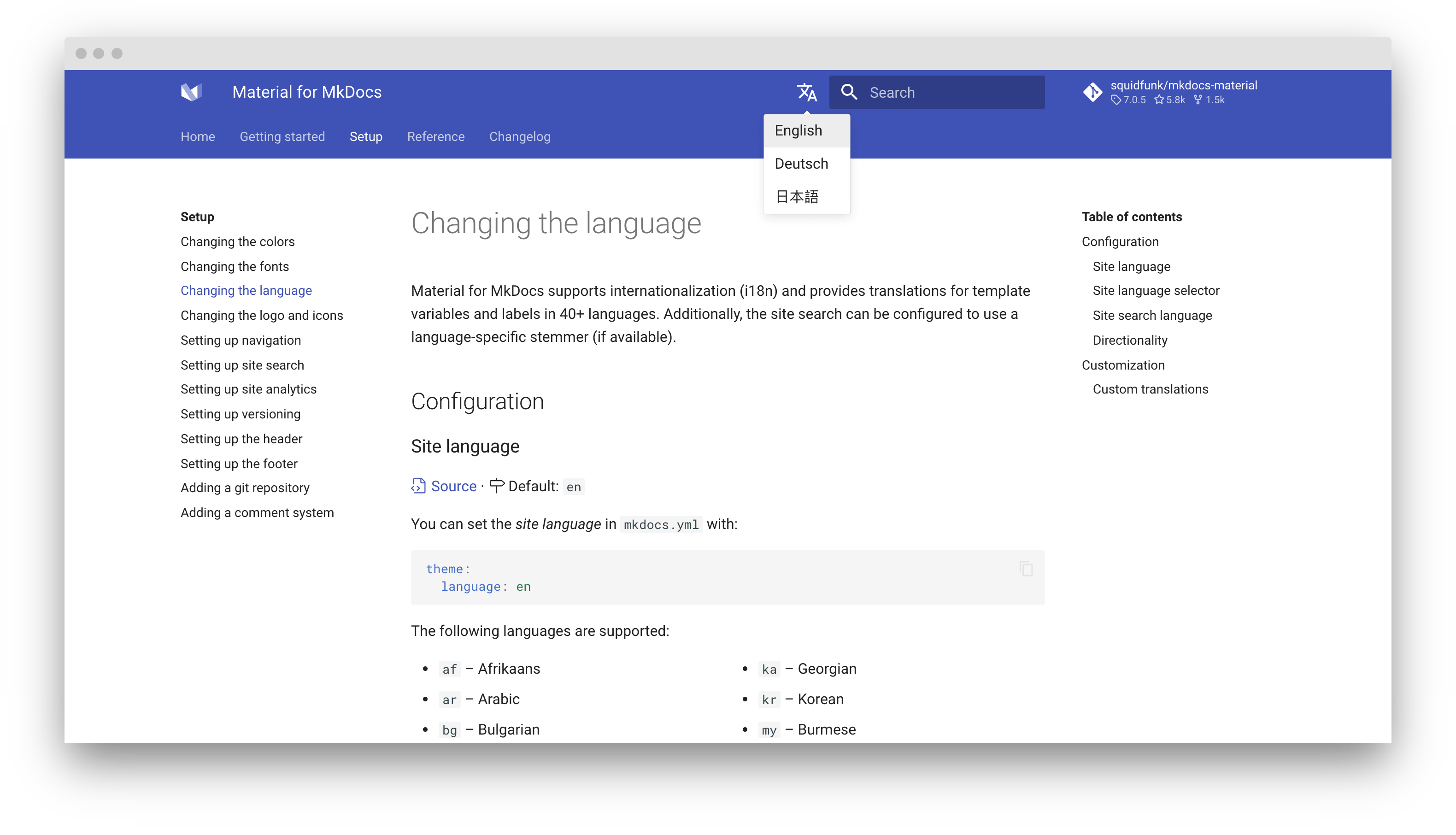Changing the language¶
Material for MkDocs supports internationalization (i18n) and provides translations for template variables and labels in 50+ languages. Additionally, the site search can be configured to use a language-specific stemmer, if available.
Configuration¶
Site language¶
1.12.0 · Default: en
You can set the site language in mkdocs.yml with:
-
HTML5 only allows to set a single language per document, which is why Material for MkDocs only supports setting a canonical language for the entire project, i.e. one per
mkdocs.yml.The easiest way to build a multi-language documentation is to create one project in a subfolder per language, and then use the language selector to interlink those projects.
The following languages are supported:
-
Afrikaans
af32 translations missing -
Arabic
arComplete -
Armenian
hy18 translations missing -
Bahasa Malaysia
ms21 translations missing -
Bengali (Bangla)
bn27 translations missing -
Bulgarian
bgComplete -
Burmese
my27 translations missing -
Catalan
caComplete -
Chinese (Simplified)
zhComplete -
Chinese (Taiwanese)
zh-TWComplete -
Chinese (Traditional)
zh-HantComplete -
Croatian
hrComplete -
Czech
csComplete -
Danish
da32 translations missing -
Dutch
nlComplete -
English
enComplete -
Esperanto
eo27 translations missing -
Estonian
et32 translations missing -
Finnish
fi32 translations missing -
French
frComplete -
Galician
gl20 translations missing -
Georgian
ka27 translations missing -
German
deComplete -
Greek
el18 translations missing -
Hebrew
heComplete -
Hindi
hiComplete -
Hungarian
huComplete -
Icelandic
isComplete -
Indonesian
id1 translations missing -
Italian
itComplete -
Japanese
jaComplete -
Korean
koComplete -
Kurdish (Soranî)
ku-IQ13 translations missing -
Latvian
lv20 translations missing -
Lithuanian
ltComplete -
Macedonian
mk20 translations missing -
Mongolian
mn25 translations missing -
Norwegian Bokmål
nbComplete -
Norwegian Nynorsk
nn14 translations missing -
Persian (Farsi)
fa2 translations missing -
Polish
plComplete -
Portuguese
ptComplete -
Portuguese (Brasilian)
pt-BRComplete -
Romanian
roComplete -
Russian
ruComplete -
Serbian
sr18 translations missing -
Serbo-Croatian
sh18 translations missing -
Sinhalese
si25 translations missing -
Slovak
sk32 translations missing -
Slovenian
sl14 translations missing -
Spanish
esComplete -
Swedish
svComplete -
Tagalog
tl18 translations missing -
Thai
thComplete -
Turkish
tr32 translations missing -
Ukrainian
ukComplete -
Urdu
urComplete -
Uzbek
uzComplete -
Vietnamese
viComplete
Note that some languages will produce unreadable anchor links due to the way the default slug function works. Consider using a Unicode-aware slug function.
Translations missing? Help us out, it takes only 5 minutes
Material for MkDocs relies on outside contributions for adding and updating translations for the almost 60 languages it supports. If your language shows that some translations are missing, click on the link to add them. If your language is not in the list, click here to add a new language.
Site language selector¶
7.0.0 · Default: none
If your documentation is available in multiple languages, a language selector pointing to those languages can be added to the header. Alternate languages can be defined via mkdocs.yml.
- Note that this must be an absolute link. If it includes a domain part, it's used as defined. Otherwise the domain part of the
site_urlas set inmkdocs.ymlis prepended to the link.
The following properties are available for each alternate language:
name-
Default: none · Required – This value of this property is used inside the language selector as the name of the language and must be set to a non-empty string.
link-
Default: none · Required – This property must be set to an absolute link, which might also point to another domain or subdomain not necessarily generated with MkDocs.
lang-
Default: none · Required – This property must contain an ISO 639-1 language code and is used for the
hreflangattribute of the link, improving discoverability via search engines.
Directionality¶
2.5.0 · Default: automatically set
While many languages are read ltr (left-to-right), Material for MkDocs also supports rtl (right-to-left) directionality which is deduced from the selected language, but can also be set with:
Click on a tile to change the directionality:
Customization¶
Custom translations¶
If you want to customize some of the translations for a language, just follow the guide on theme extension and create a new partial in the overrides folder. Then, import the translations of the language as a fallback and only adjust the ones you want to override:
<!-- Import translations for language and fallback -->
{% import "partials/languages/de.html" as language %}
{% import "partials/languages/en.html" as fallback %} <!-- (1)! -->
<!-- Define custom translations -->
{% macro override(key) %}{{ {
"source.file.date.created": "Erstellt am", <!-- (2)! -->
"source.file.date.updated": "Aktualisiert am"
}[key] }}{% endmacro %}
<!-- Re-export translations -->
{% macro t(key) %}{{
override(key) or language.t(key) or fallback.t(key)
}}{% endmacro %}
-
Note that
enmust always be used as a fallback language, as it's the default theme language. -
Check the list of available languages, pick the translation you want to override for your language and add them here.
Created: April 14, 2023
